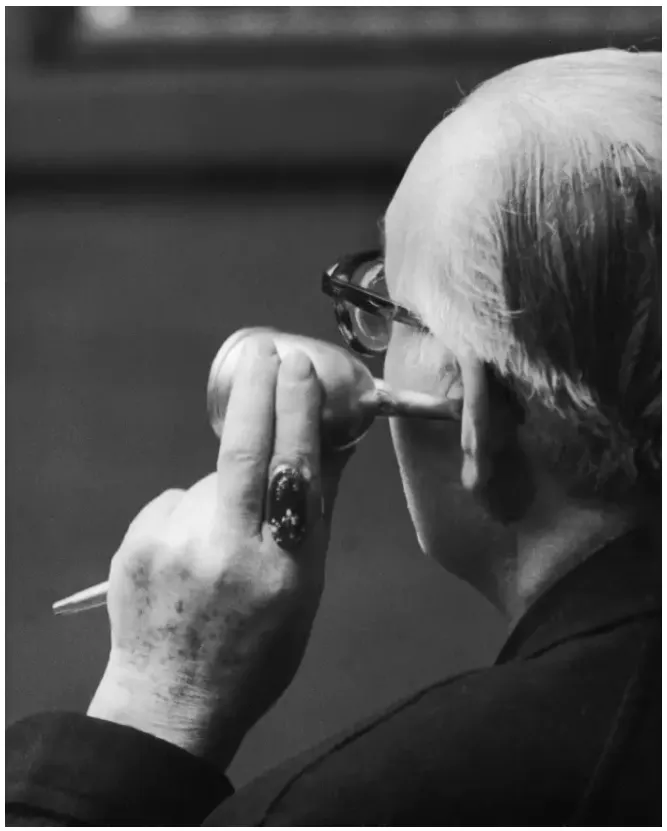
Life can be complicated. It often is. Between the sharp contrasts of black and white there is often a dim area of grey. There will always be things which can be known with absolute certainty, and things which will continue to elude the incontrovertible. But despite the long and winding mazes which run between the known and the unknown we can, if we really care to, manage to approximate what is true and what is plausible if we would only take a few moments to stop and think.
Nobody might know the reason behind the crying of a baby. An infant does not have the intellect or the physical capacity to articulate what is on its mind, but a baby does not cry for no reason at all. Is it hungry? Does it need to be changed? Was it alarmed by a pest or by an unexpected intruder? Does it miss the warmth of its mother’s body and is, thus, crying for attention? To the stranger its cries could be due to anyone of those reasons, and, quite often, the experienced ears of its mother often knows for sure. But, what the mother might be privy to in no way invalidates the possibilities entertained by others.
Although it is understandable for reasonable individuals to posit theories as to the possible causes behind the crying of babies, given the limitations just outlined, such postulations take on a different picture when individuals are able to articulate the reasons for their distress. What is frustrating, in such instances, is when observers continue to interpret what such individuals are thinking and feeling with strange and uninformed assumptions. The above scenario is akin to condescending paternalism of white America which has been the bane of Afro-Americans in their struggles against racism, bigotry, inequity and injustice. Such paternalism is often experienced when Afro-Americans offer any rational criticisms of the social, cultural, religious, political and economic aspects of society which were and are being used to suppress, disenfranchise and victimize them.
A notable example of white America’s paternalistic response to the cries of Blacks came in the aftermath of riots in communities across the nation which had erupted into violence in the mid-1960s and which reached a crescendo in 1967. Many blamed the riots on outside agitators, or on young black men who represented the largest and most visible group of rioters. President Johnson wondered if the destructive and bloody unrest was due to the influence of outside agitators. But, in March of 1968, the Kerner Commission turned those assumptions upside-down, declaring that the upheaval was due to white racism — not to some kind of innate Black anger. At first, white America did not want to listen to those who were the victims and then, after having gathered evidence by listening, they then shelved the findings of the Kerner Commission and prescribed “solutions” which, in no way at all, addressed the real issues.
The influence of groups of people upon others is not only a matter of history, but an ongoing occurrence the world over. Americans, for example, without apology or a sense of inferiority, have always boasted of how the formation of their republic was influenced by the Greek, Roman and Judaeo-Christian cultures. At no time did they frame their reception of such influences as a wide-eyed, gullible and childlike people. Such influences were carefully pondered, vigorously deliberated on, and wisely incorporated into what they considered to be their cultural and political identities. But, on the other hand, Americans have a tendency never to give to Afro-Americans the benefit of the doubt in respect to how they arrived at their own intellectual positions after having been exposed to other points of view. Any sets of ideas viewed as anti-American, which are embraced by Blacks, must have been received with reckless zeal, as if they were wayward children. In fact, because of their hubris, white Americans often arrive at wrong conclusions about Afro-Americans in respect to why they react adversely to many things that are Anglo-American or Eurocentric in nature — post slavery.
Perhaps it is not so much a matter of Americans being congenitally “tone deaf”, when it comes on to the vicissitudes of people of color, but a malady of “selective hearing”. In the matter of the findings of the Kerner Commission, for example, much of what was testified to by witnesses as to the causes of the riots of the 1960s were brought to the attention of the nation before they occurred. But, here lies the matter of the paternalism which is the subject of this oped. It was not until the issues of people of color began to threaten white America’s properties, pocketbooks and their lives that, suddenly, as if by a miracle, their ears became unstopped and they could hear with a great sense of acuity. The Montgomery bus boycott which was led by Dr. Martin Luther King, Jr., a few years before the riots, between December 5, 1955 and December 20, 1956, was another example of white American’s “selective hearing”. It was not until the cries of Black people affected their “bottom line” that the proverbial scales fell from their eyes. This is not a recent observation as American history bares this point out repeatedly.
As was the case with such Afro-Americans before him as veteran actor, singer and intellectual, Paul Robeson; as renowned sociologist and historian, Dr. W.E.B. Du Bois; and as writers like Claude McKay and Richard Wright, who all flirted with or who were unswervingly committed to Socialism, Dr. King, who did not fit the mold of the docile, childlike, and happy-go-lucky “negro”, was viewed with suspicion as his predecessors were and placed under surveillance by the F.B.I. “It must have been the Communists who were behind what Dr. King was doing!” was the thought! “It has to be an outside influence, as negroes cannot think for themselves!” Forget the fact that Dr. King was a Christian minister and a trained sociologist before that. Forget that he studied Western philosophy at the doctoral level and that he taught the works of Plato, Aristotle, Augustine, Aquinas, Machiavelli, Hobbes, Locke, Rousseau, Kant, Hegel, Bentham, and Mill to college students. Forget that he was a student of Mahatma Gandhi, who, before he led India to independence from the British was influenced by Leo Tolstoy.
Dr. King was, likely, more well read than most of the nation’s founding fathers, but yet, he was treated like an impressionable “negro”. And, what if he was a Socialist, which he was not, could it be that he cast his lot in with those who felt that capitalism and Christianity, as practiced during slavery and Jim Crow, had failed to address the needs of Black people? Whether America is “tone deaf” or suffers from “selective hearing”, Afro-Americans are always misunderstood.
On May 25, 2020, in Minneapolis, Minnesota, George Floyd was murdered in broad day light by a white police officer. His lynching was video-taped and shared on social media which erupted into worldwide protests. His death highlighted white American racism and police brutality in graphic terms, placing the nation in a bad light before the world. America’s halo as the exemplar of human rights tilted. America, again, heard and saw the plight of the Black man, one that had been spoken of, protested, video taped, and written about, over and over again, before Mr. Floyd was murdered. For a time, people of color and whites protested in the streets, in a brief moment of “Kumbayah my, Lord”. Of course, there were miscreants who seized upon the peaceful protests as a means to riot, thus causing many in white America to become afraid for their “bottom line”. Books on Afro-American History, outlining not only the tragedies but also the triumphs of Blacks — despite the scourge of racism, flooded the bookstores. But, the “positive” reaction of white Americans was short-lived, as they soon resorted to threadbare racist, paternalistic tactics which insulted and denigrated the intelligence of Blacks.
In the year following the murder of George Floyd, white America dredged up and attacked an esoteric legal philosophy, little known to most Americans, which provides a framework for critiquing the U.S. legal system via the prism of race known as Critical Race Theory (CRT). Without public discussion and analysis some began to demonize CRT. By doing so they insulted the intelligence and the academic accomplishments of its founding legal scholars, some of whom were people of color. Again, the paternalistic attitude of, “Well this must be due to some sort of external, anti-American influence, perhaps from the Marxists!” came to the fore. (Just shout “Socialism!” and everyone will lose their minds.) This was trumpeted as if everything that is “anti-American” only comes from “external” sources. We should remember, at this juncture, that the greatest domestic threat does not come from CRT, or even from that which is considered “woke”, but from the white racist nationalists! This is the official position of the F.B.I. For people of color and for other minorities the suppression of voting rights, and rampant police brutality are all “un-American”.
White Americans have mastered the art of debating without debating, and of making sense out of nonsense. They know how to fictionalize facts, and how to objectivize what is abjectly subjective. They are brilliant at deluding the nation, even some among the Afro-American community, leading them into believing that they are mind readers who know what is best for them. The chronic nature of their paternalism is evinced, for example, by their push back against even those among them who keep their ears clean — trying to understand points of view that are alien to them. The former Chief of Staff of the armed forces, General Mark Milley, is but one case in point. The following comes from an article published by Politico in June of 2021:
“The military’s top officer on Wednesday pushed back against GOP lawmakers who said the Pentagon’s efforts to combat racism and promote diversity have made the armed forces too ‘woke.’ Joint Chiefs Chair Gen. Mark Milley gave a fiery defense of open-mindedness in the ranks during a House Armed Services hearing, saying he’s offended at the accusation that those efforts have undercut the military’s mission and cohesiveness.
Milley, who was testifying alongside Defense Secretary Lloyd Austin at a hearing on the defense budget, was responding to a pair of Republican lawmakers arguing the Pentagon had embraced critical race theory, such as its inclusion in some courses at the U.S. Military Academy at West Point. ‘I personally find it offensive that we are accusing the United States military … of being ‘woke’ or something else because we’re studying some theories that are out there,’ Milley said.
The four-star general told lawmakers that service members should be ‘open-minded and be widely read’ because service members ‘come from the American people’ and said he wanted to better understand racism as well as the climate that led to the Jan. 6 Capitol insurrection.
‘I want to understand white rage — and I’m white,’ Milley told lawmakers ‘What is it that caused thousands of people to assault this building and try to overturn the Constitution of the United States of America?
‘I’ve read Mao Tse Tung. I’ve read Karl Marx. I’ve read Lenin. That doesn’t make me a communist,’ Milley continued. ‘So what is wrong with understanding, having some situational understanding about the country for which we are here to defend?’“
It appeared that General Milley came closer to understanding how people of color feel whenever they are pricked by the barbs of white racist paternalism. He would, no doubt, appreciate the following words from Maya Angelou:
“Prejudice is a burden that confuses the past, threatens the future, and renders the present inaccessible.”



